“A dialogue and development of ecumenical relationships with Ukrainian Orthodoxy is a pastoral imperative,” His Beatitude Sviatoslav
Thursday, 15 November 2012, 22:26 Taking into account the multiculturalism and the multi-religiousness of contemporary Ukraine, a UGCC priority -- its main mission -- is an ecumenical dialogue. Since most Christians in Ukraine declare themselves as traditionally belonging to the Orthodox Church, the dialogue and development of ecumenical relationship with Ukrainian Orthodoxy is a pastoral imperative.Focusing on this thought, UGCC Head His Beatitude Sviatoslav delivered his speech to the plenary session of the Pontifical Council for Promoting Christian Unity. As was previously reported, on November 12-16, 2012, in the Vatican a plenary session of this Council is taking place. The topic under discussion is “The significance of ecumenism for a new evangelization.” This issue is closely related to the topic covered by the Thirteenth General Assembly of the Synod of Bishops, which was “New evangelization for transmitting faith,” as reported by Radio Vatican.
“The main obstacle to building a fruitful dialogue with the Orthodox World in Ukraine,” noted UGCC Head “is the painful division within Ukrainian Orthodoxy itself. Truly, today, in our land there exist three Orthodox communities. Among them there are irreconcilable contradictions on ecclesiological grounds: each one of these Churches negates the right of the other two to exist. Only the Ukrainian Orthodox Church (Moscow Patriarchate) is considered by the Orthodox World as a “canonical Church,” which, although it does belong to the Moscow Patriarchate, practices a certain autonomy.”
Furthermore, His Beatitude Sviatoslav provided statistics demonstrating that the largest in terms of number of parishes is the Ukrainian Orthodox Church (Moscow Patriarchate), claiming among its followers 31 % of Ukraine’s population.
Later he also touched on the problem of the politicized nature of Ukrainian Orthodoxy and the investment of political forces into religious life for the purpose of using the Church as an instrument for the realization of their own goals. This fact causes quite a bit of suffering for the Churches themselves and hardships on the road towards unity of all Christians in Ukrainian society.
For ecumenical dialogue, the existing division of Ukrainian Orthodoxy is the most severe impediment. However, it is paramount to acknowledge, that the experience of the All-Ukrainian Council of Churches and Religious Organizations (AUCCRU) demonstrates that the Churches in Ukraine have learned how to work together and to solve difficulties in a brotherly peaceful manner,” underlined the speaker. Among others, UGCC Primate emphasized the palpable feeling of progress in the relationship of the Ukrainian Greek-Catholic Church with the Ukrainian Orthodox Church (MP).
In continuing his speech, UGCC presented other impediments on the road toward am ecumenical dialogue and understanding, in particular the accusations from the side of Ukrainian Orthodox Church (MP), alleging that Ukrainian Greek-Catholics in the 90s took from them about 500 “Orthodox churches,” although -- as we know -- these churches were built as those of Greek-Catholic or Roman Catholic, and only during the Soviet period were transformed into properties of the Ukrainian Orthodox Church (MP).
His Beatitude Sviatoslav believes that in order to be able to plan new roads of reconciliation among Churches – something to which UGCC was always open -- it is, at first, necessary to expose the whole truth. “We are convinced that we will be able to find a path in order to heal the wounds of the past, by forgiving and asking for forgiveness… We are certain that the path towards reconciliation between the Ukrainian Greek-Catholic Church and the Russian Orthodox Church on the basis of historical and pastoral realism is an effective means of renewing dialogue and creating a new model of ecumenical relations,” emphasized the UGCC Head.
At the beginning of his presentation, His Beatitude Sviatoslav reviewed the socio-political situation in Ukraine and the role of UGCC in the development of civil society. He highlighted that Ukraine is a European nation with ancient Christian roots, while being a relatively young democratic country. And the renovation of a post-soviet society, the period of religious freedom, the first successes and failures of a young democracy – these are all reasons that form the materials and foundation of challenges for a new evangelization in Ukraine.
His Beatitude Sviatoslav stressed that Ukrainian Greek-Catholic Church, as well as other traditional Churches, enjoy great respect in society. This provides the possibility of bearing witness to Christian and generally human values, that is, to fulfill a critically important mission in society. And on the basis of the All-Ukrainian Council of Churches and Religious Organizations (AUCCRU), he demonstrated the openness of the Churches to an ecumenical dialogue and collaboration in promoting the national and public dialogue.
Background from Radio Vatican
| The Pontifical Council for Promoting Christian Unity was founded in 1960, then as the "Secretariat for Promoting Christian Unity." Today this Vatican organization is a permanent member of the Roman Curia which fulfills a double role: the generation in the Catholic Church an authentic ecumenical spirit, according to the decree on ecumenism, Unitatis redintegratio of the Second Vatican Council, and the development of a dialogue and cooperation with other Christian Churches. Since 2010, Cardinal Kurt Koch has served as President of the Council. |
On June 12, 2012 Pope Benedict XVI named as a member of the Pontifical Council for Promoting Christian Unity, the Head of the Ukrainian Greek-Catholic Church, His Beatitude Sviatoslav , who is now for the first time participating in the plenary session of the Council.
UGCC Department of Information

We can imagine what the prayer of the prisoners in the Russian torture centers in the Ukrainian Kharkiv region was like – Head of the UGCC on the 206th day of the war 17 September
A vast cemetery, a mass burial, was found near the city of Izyum, in which more than 400 innocently killed and tortured people have already been...
-
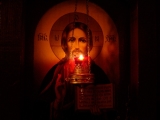 Глава УГКЦ у 158-й день війни: «Нехай Господь прийме з уст нашої Церкви псалми та моління за всіх тих, які особливо просять нашої молитви»
Глава УГКЦ у 158-й день війни: «Нехай Господь прийме з уст нашої Церкви псалми та моління за всіх тих, які особливо просять нашої молитви»
-
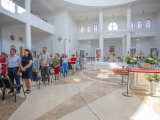 «Сила, яка походить із вірності Христові, є стержнем, який ніхто не може зламати», – Блаженніший Святослав
«Сила, яка походить із вірності Христові, є стержнем, який ніхто не може зламати», – Блаженніший Святослав
-
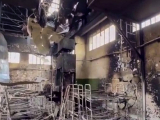 Глава УГКЦ у 157-й день війни: «В ім’я Боже ми засуджуємо звірства в Оленівці і світ повинен це засудити як особливий вияв дикості й жорстокості»
Глава УГКЦ у 157-й день війни: «В ім’я Боже ми засуджуємо звірства в Оленівці і світ повинен це засудити як особливий вияв дикості й жорстокості»
-
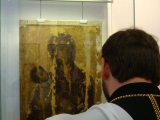 «Боже, почуй наш плач і поспіши нам на допомогу і порятунок!», – Глава УГКЦ у 156-й день війни
«Боже, почуй наш плач і поспіши нам на допомогу і порятунок!», – Глава УГКЦ у 156-й день війни
-
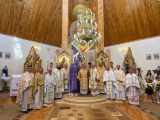 «Бог йому дав серце і душу українського народу»: відбулася щорічна проща до Прилбичів з нагоди уродин митрополита Андрея Шептицького
«Бог йому дав серце і душу українського народу»: відбулася щорічна проща до Прилбичів з нагоди уродин митрополита Андрея Шептицького
-
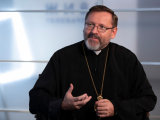 Глава УГКЦ: «Я горджуся українськими патріотами, які без найменшої краплі ненависті готові захищати своє»
Глава УГКЦ: «Я горджуся українськими патріотами, які без найменшої краплі ненависті готові захищати своє»
-
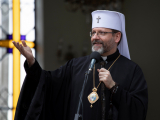 Блаженніший Святослав закликав українську молодь скласти присягу на вірність Христові
Блаженніший Святослав закликав українську молодь скласти присягу на вірність Христові
-
 Глава УГКЦ у 155-й день війни: «Помолімося, щоб не втратити скарбу віри князя Володимира»
Глава УГКЦ у 155-й день війни: «Помолімося, щоб не втратити скарбу віри князя Володимира»
-
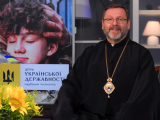 Блаженніший Святослав у День державності України: «Наша Держава – це для нас питання життя або смерті»
Блаженніший Святослав у День державності України: «Наша Держава – це для нас питання життя або смерті»
-
 Глава УГКЦ у 154-й день війни: «Нехай Господь Бог прийме у свої вічні обійми журналістів, які віддали за правду своє життя в Україні»
Глава УГКЦ у 154-й день війни: «Нехай Господь Бог прийме у свої вічні обійми журналістів, які віддали за правду своє життя в Україні»
-
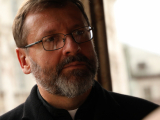 Глава УГКЦ у 153-й день війни: «Принесімо наш біль перед Боже обличчя і будьмо певні, що Він нас вислухає»
Глава УГКЦ у 153-й день війни: «Принесімо наш біль перед Боже обличчя і будьмо певні, що Він нас вислухає»
-
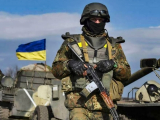 Глава УГКЦ у 152-й день війни: «Помолімся молитву заступництва за наших воїнів»
Глава УГКЦ у 152-й день війни: «Помолімся молитву заступництва за наших воїнів»
-
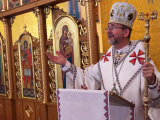 «Віруюча людина не може бути байдужою, коли бачить страждання іншої людини», – владика Богдан Дзюрах
«Віруюча людина не може бути байдужою, коли бачить страждання іншої людини», – владика Богдан Дзюрах
-
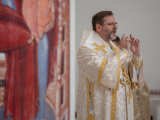 «Серед нашого страждання творімо простір для прояву Божої всемогутності», – Глава УГКЦ у 6-ту неділю після П’ятдесятниці
«Серед нашого страждання творімо простір для прояву Божої всемогутності», – Глава УГКЦ у 6-ту неділю після П’ятдесятниці
-
 Глава УГКЦ у 151-й день війни: «Російське віроломство ми перемагаємо силою любові до нашої Батьківщини»
Глава УГКЦ у 151-й день війни: «Російське віроломство ми перемагаємо силою любові до нашої Батьківщини»

